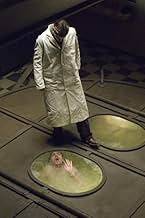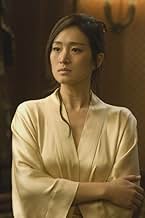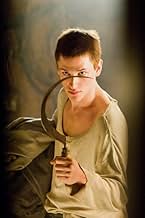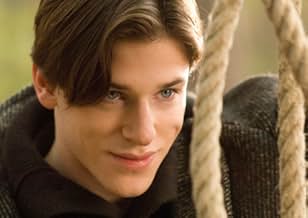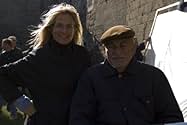Trauma and tragedy during World War II warp young Hannibal Lecter's mind.Trauma and tragedy during World War II warp young Hannibal Lecter's mind.Trauma and tragedy during World War II warp young Hannibal Lecter's mind.
- Awards
- 2 nominations total
Michelle Wade
- Nanny
- (as Michele Wade)
Featured reviews
As a fan of all the Hannibal Lector films, I was expecting another film I'd enjoy and thinking this would be a terrific character study of man who is one of the most famous fictional killers of all time. What I got instead was more of a simple revenge story than the character study. Oh, yeah, we do learn some background of the famous "Dr. Lector," but not enough of what really made him the weird combination of intellectual and cannibal. Although portraying and having someone in the film label the young adult as "monster," the filmmakers (actually, author Thomas Harris) really made him more of a sympathetic character instead. They took the easiest road, out, too, making an easy target the villains: the Nazis. How often has Hollywood done that, even today 60 years after the conclusion of WWII. What we get is a revenge story of how Lector went from a child captive of the Nazis for a short time, to a medical student in Paris and how he tracked down the Nazis who killed the rest of his family. Of particular incentive to him was the avenging of his sister's death. There is a neat little twist at the ending regarding that but I go into that for spoiler reasons. The best part of the film was the absolutely gorgeous cinematography. This is beautifully filmed, first frame to last. The story is much better in the second half than the first, which has a few parts in which it lags. I'm not quite sure about the credibility of having an Asian aunt raise him, but I also enjoy seeing actress Gong Li. Her relationship with young Hannibal is a strange one. Gaspard Ulliel as Hannibal was okay but certainly not as riveting in the role as the mature Anthony Hopkins was in his three performances. Why a young French actor, who has all the accents that Hopkins doesn't have, would play the role, I don't know. Overall, I'm glad I saw it but, unlike the three other Hopkins' "Lector films," this is one I won't add to my movie collection. However, at least I learned what the most tasty part of the human anatomy is, not that I would ever put that information to use!
I don't put this in the same category
as the 3 previous films with Hopkins
(counting Manhunter out completely,,
even though it is a very good film). This movie is another animal altogether. Not
only bc this has a young actor playing a young Lecter,, but bc this is the origin story,, how he became the monster. This movie shows so many new sides to the character. A helpless child,, a traumatized teen,, a deranged young man trying to put his memories together to exact his revenge,,, and also, love. His love for the sister he lost, and also his widowed aunt.
If you are a fan of the Hopkins trilogy,, then you must see this,,,
If you are a fan of the Hopkins trilogy,, then you must see this,,,
Designed as a prequel to SILENCE OF THE LAMBS (and MANHUNTER before it), this is a film that aims to show how Hannibal Lecter ended up as the human cannibal that we all know and fear. Many people criticised this film, arguing that familiarity breeds contempt and the more we learn about a killer's background and origin, the less frightening he becomes. They have a point, but they're also missing something: HANNIBAL RISING is a very well made and entertaining movie in its own right. My advice is to forget all about the connections with the later films and just enjoy this film on its own merits.
It's a distinctly European film with a European sensibility and a young, French, unknown lead actor. It has a level of classiness that's not present in many an American film; a sheen of quality that sets it apart from the rest. The opening sequence, set in the latter days of World War 2 and detailing horrific events in Lithuania, is very well handled, full of foreboding, great effects, and sinister actions. It ably sets up the rest of the film, which turns out to be a revenge flick with the added intrigue of having the main character becoming more and more sick and twisted as the movie progresses.
One thing that stands out is the quality of the cast. The unknown Gaspard Ulliel is weird and brilliant as the young killer, and you quite believe he's a sociopath. There's a romantic sub-plot that goes nowhere involving the lovely Gong Li (CURSE OF THE GOLDEN FLOWER) but it does serve to humanise the monster a bit. The ever-reliable Dominic West is also very good as the policeman investigating Hannibal's crimes, although his role is completely extraneous to the thrust of the film. The bad guys, too, are very well cast and all of them thoroughly despicable chaps: Kevin McKidd, Richard Brake, and in particular a cast-against-type Rhys Ifans all make an impact here.
The violence that plays out is entertaining because the villains all deserve it: from the butcher slashed apart with a samurai sword to the guy strangled and eaten, these men are repulsive and their deaths well earned. Another highlight is that the film doesn't focus on the gore, either, not in a repulsive way like HANNIBAL; there's nothing stomach churning here. The cannibalism ends up as a sub-plot, really, not involved with the main film, but that didn't bother me too much. I enjoyed the pacing, the acting and the direction, and found all three of those elements assured and designed to entertain.
It's a distinctly European film with a European sensibility and a young, French, unknown lead actor. It has a level of classiness that's not present in many an American film; a sheen of quality that sets it apart from the rest. The opening sequence, set in the latter days of World War 2 and detailing horrific events in Lithuania, is very well handled, full of foreboding, great effects, and sinister actions. It ably sets up the rest of the film, which turns out to be a revenge flick with the added intrigue of having the main character becoming more and more sick and twisted as the movie progresses.
One thing that stands out is the quality of the cast. The unknown Gaspard Ulliel is weird and brilliant as the young killer, and you quite believe he's a sociopath. There's a romantic sub-plot that goes nowhere involving the lovely Gong Li (CURSE OF THE GOLDEN FLOWER) but it does serve to humanise the monster a bit. The ever-reliable Dominic West is also very good as the policeman investigating Hannibal's crimes, although his role is completely extraneous to the thrust of the film. The bad guys, too, are very well cast and all of them thoroughly despicable chaps: Kevin McKidd, Richard Brake, and in particular a cast-against-type Rhys Ifans all make an impact here.
The violence that plays out is entertaining because the villains all deserve it: from the butcher slashed apart with a samurai sword to the guy strangled and eaten, these men are repulsive and their deaths well earned. Another highlight is that the film doesn't focus on the gore, either, not in a repulsive way like HANNIBAL; there's nothing stomach churning here. The cannibalism ends up as a sub-plot, really, not involved with the main film, but that didn't bother me too much. I enjoyed the pacing, the acting and the direction, and found all three of those elements assured and designed to entertain.
Hannibal Rising is a dark and thrilling grand guignol excursion into the formative (but still plenty brutal) years of the infamous Hannibal Lecter. Considering the amount of psychological material the film would appear to have to get through, I think it definitely errs on the side of briskness. In a broad sense, many important sequences are played out and edited very quickly, and this saps them of some of their resonance, but the mood does gradually coalesce into something followers of the prior films and novels will recognise, and will be rewarded in revisiting.
The teen-adult Hannibal as played by Gaspard Ulliel is pale and handsome, and his red slash of a mouth is always very much in evidence, signalling violence and malice, and reminding us of the flesh that we know will come to pass through it. After surviving some murky carnage on the Eastern Front during World War II, he eventually seeks out remaining family in the form of his widowed aunt in France (Gong Li). He begins to open to a more regular life under her curious guidance, but the post-war environment is conducive to grudges and violence, and these are the sparks that are quickest to ignite in Lecter. Direction in this all-too-brief part of the film is some of its best, as it visually and thematically stitches together Hannibal's fascinations so that we can feel them wrap around each other - blood, violence, his own incestual leanings towards his aunt, and his childhood bond with his late sister, Mischa.
After the first murder, though, (which definitely doesn't disappoint) it's a straighter ride through many more on the path of vengeance. It all makes for a fine thriller, but development in Lecter's character beyond this point is harder to read, and Ulliel's performance offers much relish but not-so-much variation. Of the other films in the series, this one has the most in common, stylistically and in subject matter, with Hannibal. As my friend also suggested when we left the cinema, I still feel there could easily be another film out there to deal with Hannibal practising as a psychiatrist and murdering folks on the side, pre-Silence Of The Lambs. This one offers the concrete details of his origins within a thrilling story, but somehow doesn't feel as deep or profound as I'd hoped it would - and I wish it would just relax and offer some longer scenes and more ambiguous moments at times. Nevertheless, Hannibal Rising is a strong film.
The teen-adult Hannibal as played by Gaspard Ulliel is pale and handsome, and his red slash of a mouth is always very much in evidence, signalling violence and malice, and reminding us of the flesh that we know will come to pass through it. After surviving some murky carnage on the Eastern Front during World War II, he eventually seeks out remaining family in the form of his widowed aunt in France (Gong Li). He begins to open to a more regular life under her curious guidance, but the post-war environment is conducive to grudges and violence, and these are the sparks that are quickest to ignite in Lecter. Direction in this all-too-brief part of the film is some of its best, as it visually and thematically stitches together Hannibal's fascinations so that we can feel them wrap around each other - blood, violence, his own incestual leanings towards his aunt, and his childhood bond with his late sister, Mischa.
After the first murder, though, (which definitely doesn't disappoint) it's a straighter ride through many more on the path of vengeance. It all makes for a fine thriller, but development in Lecter's character beyond this point is harder to read, and Ulliel's performance offers much relish but not-so-much variation. Of the other films in the series, this one has the most in common, stylistically and in subject matter, with Hannibal. As my friend also suggested when we left the cinema, I still feel there could easily be another film out there to deal with Hannibal practising as a psychiatrist and murdering folks on the side, pre-Silence Of The Lambs. This one offers the concrete details of his origins within a thrilling story, but somehow doesn't feel as deep or profound as I'd hoped it would - and I wish it would just relax and offer some longer scenes and more ambiguous moments at times. Nevertheless, Hannibal Rising is a strong film.
Like come on, sure it's not silence of the lambs, but nominated for worst sequel/horror movie, that's just dumb. Snobby reviewers who can't judge a movie on its own merits, only a comparison to one of the greatest thrillers ever made. Of course any other Hannibal stories won't compare, doesn't mean they are aweful. This is an interesting tale of revenge that setups the character. Worth the watch if you enjoy the Hannibal movies.
Did you know
- Trivia"Lady Murasaki" (Shikibu Murasaki) is actually the name of an 11th-century Japanese novelist. Her "The Tale of the Genji" is regarded as a masterpiece of Japanese literature. In the book on which this film is based, Lady Murasaki is indeed a descendant of the 11th-century novelist. She and Hannibal even quote "The Tale of the Genji".
- GoofsWorld War II German "dogtags" didn't have the name of the soldier on them. Instead they listed the unit that they were in when the tag was issued, and a serial number.
- Quotes
Hannibal Lecter: Rudeness is an epidemic.
- Alternate versionsFor the German retail market a cut version was created (based on the theatrical version) which misses ca. 13 minutes. This version is rated "Not under 16". Theatrical and US-Unrated version are also available with a "Not under 18" rating but have some sales restrictions.
- ConnectionsFeatured in HypaSpace: Episode #6.25 (2007)
- SoundtracksPesnya o Staline
Written by Aleksandr Aleksandrov (as A. Alexandrov) and Sergey Alymov (as S. Alymov)
Public Domain
(misspelled as "Pensya o Staline")
Details
- Release date
- Countries of origin
- Official sites
- Languages
- Also known as
- Hannibal, el origen del mal
- Filming locations
- Production companies
- See more company credits at IMDbPro
Box office
- Budget
- $75,000,000 (estimated)
- Gross US & Canada
- $27,670,986
- Opening weekend US & Canada
- $13,051,650
- Feb 11, 2007
- Gross worldwide
- $82,169,884
- Runtime
- 2h 1m(121 min)
- Color
- Sound mix
- Aspect ratio
- 2.35 : 1
Contribute to this page
Suggest an edit or add missing content





